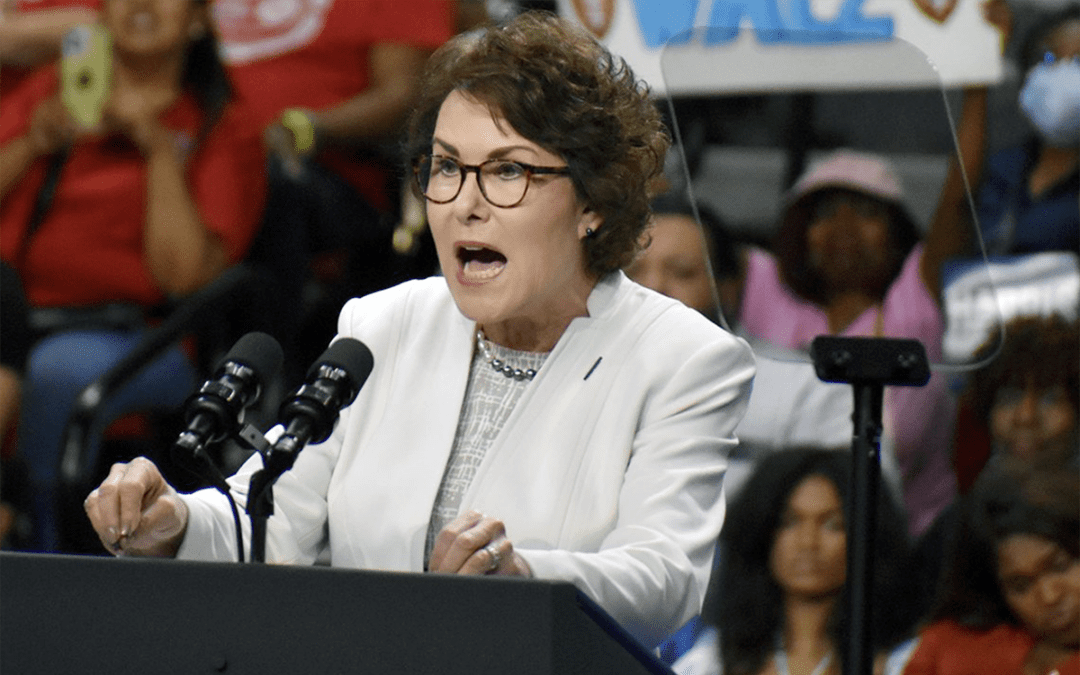
Nevada Democratic US Sen. Jacky Rosen sits down with The Nevadan during an exclusive sit-down interview at the Nevada State Democratic Party headquarters on Friday, Oct. 4, 2024, in Las Vegas. (Photo credit: Joel Romo/Special to The Nevadan)
In a recent sit-down with The Nevadan, incumbent Democrat Jacky Rosen explains how this year’s election could impact the future of issues ranging from affordable housing to reproductive freedom.
Political junkies and polling experts have long hailed Nevada as one of the handful of battleground states nationwide that have an outsize impact in determining the next president — though the Silver State may also very well decide which major political party controls the US Senate for the foreseeable future.
While a win in Nevada could propel either Democratic nominee Kamala Harris or Republican former President Donald Trump to the White House, the party in control of the Senate will ultimately decide which of the president’s political and judicial appointees are approved, and can otherwise determine what sorts of laws get passed — or don’t — under the next administration.
In Nevada, Democratic Sen. Jacky Rosen is seeking her second term, and is facing off against Republican political newcomer Sam Brown. Rosen worked for years as a computer programmer, and also previously served as President of Congregation Ner Tamid, Nevada’s largest synagogue, before winning a US House seat in 2016 and parlaying that into an upset over former Republican US Sen. Dean Heller in 2018.
Now, it’s Rosen playing defense against Brown, a retired US Army Captain and businessman who has mounted two previous unsuccessful runs for public office, but who’s fundraising savvy caught the eye of national Republicans (Brown has raised roughly $10 million to date, a figure that’s however been dwarfed by the $23.6 million hauled in thus far by Rosen).
Even with Trump’s endorsement of Brown and a neck-and-neck presidential race, Rosen has maintained a steady polling lead over her opponent. Harris is leading by an average of nearly one percentage point in recent polls, according to FiveThirtyEight, while Rosen is maintaining an average lead of nine points.
Still, Rosen told The Nevadan during a recent exclusive interview that she isn’t taking the race for granted.
“There are only 100 of us — it’s not a huge group at all,” Rosen said of the Senate.
MORE: Home ownership is becoming less attainable in Southern Nevada. Harris’ housing plan could reverse the trend.
Below is a transcript of The Nevadan’s interview that has been edited for clarity and brevity.
The Nevadan: Let’s start with some news that recently came out of your office. You helped introduce a bill you’re calling the CONSTRUCTS Act, which would expand vocational programs for construction workers with the end goal of hoping those new workers will drive down the cost of labor, therefore lowering housing prices. How will this bill achieve that, and what else can Congress do to make housing more affordable?
Rosen: That’s a great question and I’m glad you asked that because we love this bill. So what that bill does is really invest in our labor workforce, building out our apprenticeships, advanced manufacturing, all of those things, because for the past few years, we have made historic investments in our infrastructure. We’ve built roads and bridges, and have been installing broadband. And in Nevada, we have wind, water, solar, geothermal, and critical minerals — and more solar jobs per capita than anyone else. But we need labor to do all of that. We need electricians, we need carpenters, metal workers — you name it. So this is one of the things the CONSTRUCTS Act does, because we can invest and put all this money into buildings, but those things don’t build themselves. What builds it? People.
So that is what’s exciting about this bill, and a few of the other things that we can do, because, of course, affordable housing is at the top of everybody’s mind as well. Number one, we can fight corporate greed. Here in Nevada — I can’t speak for other states — but we have big corporate investors that are coming here, particularly in Las Vegas, they’re buying up all the homes they can, and then they jack up the prices on everyone. That’s price gouging, and I actually have a bill out there that will hold them accountable. If they’re found to be doing that, then they pay fines, and that fine goes back into the buckets for putting more funding into affordable housing.
In terms of affordable housing, I helped here by bringing $500 million for the Home Means Nevada program for affordable housing. That’s going to help thousands and thousands of Nevadans.
Another thing we can do, and that’s been done recently, is calling on the Fed to lower interest rates. They’ve done that, and it’s lowering costs for the people building the homes, and, of course, when you go to get a mortgage, you can have a lower rate. So this is a win-win. So we can lower the cost, and, on top of that, I have a bill giving first-time homebuyers a tax credit to get them into their first home. In regards to housing, we’ve been taking an all-of-the-above approach.
The Nevadan: You mentioned the bill to provide down payment assistance to first-time home buyers. You’ve also recently introduced a bill that would establish a $50,000 tax credit for entrepreneurs starting their first small business. These proposals are key parts of Vice President Kamala Harris’ economic plans. Why start working on her agenda now when the election hasn’t even happened yet?
Rosen: Well, I already had a bill before the Vice President said that we should raise the limits for first-time homebuyer tax credits, but what I want to talk to you about is tourism is at the top of Nevada’s economy. But what most people don’t realize is that 99% of the businesses in Nevada are actually small businesses, being 500 employees or under.
I sit on the Small Business and Entrepreneurship Committee, so we know that it costs between $40,000 and $50,000 on average for someone to start a business. So giving our entrepreneurs a chance to start that small business and realize their dream with a $50,000 tax credit. That’s really important.
Another thing I’ve done here is that we have a lot of veterans. They’re really entrepreneurial. We never had a Veterans Business Outreach Center. That’s a program from the SBA (US Small Business Administration). They have these outreach centers to help our minority communities, business communities — they work with our chambers of commerce, and they make sure that small businesses get all the benefits they can through the SBA that they’ve earned and deserved.
But by bringing the first-ever Veterans Business Outreach Center to Nevada, that’s going to help veterans offices in the South and in the North. And it’s very important that we do that. We’ve been trying to find ways in the Small Business Committee to continue to incentivize people to open their small businesses and give them that capacity to grow, hire others, and live out that dream.
The Nevadan: Let’s go back to housing for a second. Renters have seen a huge increase in their monthly rent payment, especially since the COVID pandemic. What are you working on to help renters who may feel stretched thin, especially since they make up a huge bloc of the folks living in cities like Las Vegas and Reno?
Rosen: Well, we just talked about interest rates, so let’s say people want to build apartments. It’s going to be cheaper to build that complex with lower interest rates, and the cheaper it is for them to build, the hope is that it’s passed onto the consumer. Investments in things like the Home Means Nevada program that I mentioned earlier will help. Like I said we’ve put $500 million into that.
Some of the other things we can do, particularly here in Nevada, is that we have over 80% land belonging to the federal government. So have to continue introducing federal legislation in order to release land for smart development. I’ve introduced one for Washoe County, and I’m working with Sen. [Catherine] Cortez Masto for one here in Clark County. But, I’ll tell you: in Washoe, we’re releasing thousands of acres for smart development with an emphasis on affordable housing. This is kind of unique to Nevada, so, this way when our county planners, our city councils and all of those things up in Washoe County, they can do smart planning with an emphasis on affordable housing. It’s been endorsed by the Reno-Sparks Chamber of Commerce.
But when we lower interest rates, we release public land with an emphasis on affordable housing, we create that first-time homebuyer tax credit, we have more labor to build homes — all of that is going to work together to help us continue to build our our inventory, and, of course, crack down on those corporate investors who love to come to Nevada and suck up our inventory. We’re not going to let them do that anymore.
The Nevadan: That issue of releasing public lands was something that came up during the recent vice presidential debate. How do you balance the need to release new land to develop with the needs of tribal and environmental groups that can be opposed to sprawling development?
Rosen: I’m glad you bring that up. Part of the reason the Washoe County lands bill has so much support is because we’ve brought all the stakeholders to the table. So there are tens of thousands of acres set aside for conservation, and we worked with our tribal communities. These are sacred lands and sacred spaces that they need to get to. We work with our business communities, our charities and nonprofits, our local electeds, our city council, our planners, and for us in Nevada, we even have to sometimes work with the Department of Defense.
In Northern Nevada we have Fallon Naval Air Station — we’ve had an expansion to that in the last few years. Nevada is critical to the nation’s safety and security. That’s why there’s so much land owned by the federal government here. So we’ve brought all the stakeholders together so we are conserving and protecting everything we need to, and allowing for smart development. We are continuing to grow, and we have to do that in a responsible way. And you need places for schools and parks and churches and hospitals.
The Nevadan: Latino Americans and Latino immigrants are becoming a larger bloc of Nevada’s population, and are becoming an especially critical part of the workforce in sectors like construction, health care, and others. How will Harris’ economic plans benefit the Nevada Latino population?
Rosen: We have about 30% of our population here identifying as Latino. And, in going back to small business for a second, they start more small businesses than just about anybody. Latinos are very entrepreneurial, and we’re trying to be sure that they have all those small business resources to make them work. But in talking about our labor workforce, it’s important that we build out those apprenticeships. So whether it’s in labor in trades like construction, electrician work, and all of that — whether it’s in our tech area: you can get certificates in cyber security, networking and so many other things — but you can go right to work.
And we need to continue to build out our healthcare workforce. We’re short about 4,000 nurses here in Nevada. I’m glad to talk about what we’ve done there. So in our Latino communities, there are people who want to do all kinds of things. So we have to be sure that we expand these training opportunities for everyone, so that they can get these great-paying jobs, take care of their families, invest back in their community by buying a home, renting somewhere affordable. Our latino communities are no different than anyone else in their desire to take care of their families with a good paying job, benefits, a future, a pension, and, particularly, we have a lot of union jobs here. Those will help our Latino community find whatever field they want to go into, whether it’s teaching, nursing, labor, tech, hospitality. Pick a field, we have jobs, and lots of those are in shortage.
The Nevadan: You and other Democratic colleagues have been outspoken about the proposed Kroger-Albertsons merger. Despite plans to spin off some Albertsons, even here in Nevada, you and other lawmakers have said the merger would result in higher prices, and have expressed that regulators should nix the acquisition. How did you come to that conclusion, and why is this merger wrong for Nevadans?
Rosen: I can’t speak for other states, but in Nevada we have a really high number of both Kroger and Albertsons stores here. And in some of our smaller communities they are the only two stores, so it doesn’t take a rocket scientist to realize that if they were to merge that they won’t keep both stores operational. If they merge, they may consolidate. So what will happen to all those jobs? And when you reduce competition, prices usually don’t go down. This is an issue that really impacts us, and it impacts us as a market. That is why we are asking the Federal Trade Commission to put a block on the Kroger-Albertsons merger, because it’s going to disproportionately hurt Nevadans.
There has also been a big consolidation among food corporations that control things like beef, chicken, and eggs. And when they consolidate, they corner the market, and when you reduce competition, it usually doesn’t result in lower prices. So we have to hold them accountable, and that’s what we’re going to do so we can get better prices. People need to eat and feed themselves, while they’re making record profits quarter after quarter. And we’ve got to stop that.
The Nevadan: Price gouging is something you, Harris, and other Democrats have talked about as a leading contributor to today’s high prices. And while polling shows public support for efforts to crack down on anticompetitive behavior, polls also show people don’t want to use the government to set specific prices on goods. How do you educate the public on the difference between the two?
Rosen: Price controls and price gouging are two different things. We’re not going to tell somebody what to set a price at, but we have to be sure that people don’t make record profits on the backs of everyone else, while ripping us off.
For the sake of argument, let’s pretend we’re buying a bag of potato chips. What used to be a 12 ounce bag, they might be selling an eight ounce bag for the same price. I think they call it shrinkflation, but you can call it price gouging.
And we have capitalism. There’s no reason why these companies can’t make a living or make a profit, but when they continue to deceive or consolidate, and raise prices in a way that hurts everyone else while they’re making record profits, all while they’re looking for tax loopholes and not paying their fair share. That’s why we have to hold them accountable and be transparent, so that they are good community partners with all of us.
We don’t want to tell them what to charge. We just want to make sure that they don’t rip us off. And I’ll make one more example. Of course, we’ve had the wildfires up north, or the recent hurricanes. But imagine there’s a natural disaster and somebody has a warehouse full of water. Well, if normally the bottle of water is a dollar, maybe they’ll sell it to you for $2 or $3 after the hurricane. But if they try to sell it to you for $100, that’s price gouging. That’s taking advantage of people in a desperate situation. We don’t want people taking advantage of that.
The Nevadan: You and other Democratic colleagues have been very critical of former President Donald Trump for more or less tanking the bipartisan border deal—
Rosen: Not more or less. He did tank it.
The Nevadan: Point being, it seemed to have had the legs to pass before Trump put his thumb on the scale. Our question is, Harris has said this would be a day-one priority if elected, and Trump has made his own promises on immigration, but will both sides be able to work on a fix for the border once the election passes?
Rosen: The Border Protection Act was negotiated by a Republican, an independent, and a Democrat. It was a really good nuts-and-bolts bill. What do I mean by that? It was actually endorsed by the Border Patrol union. Why? When you go down there to the border — I’ve been multiple times — and our border patrol agents say they need the tools, technology, and resources to stop the flow of fentanyl, human trafficking, and contraband from coming in. This bill would have also allowed for new funding for things like x-ray bays, so that people are bringing things lawfully into this country.
So it’s really sad that Donald Trump told everyone to oppose it, when this was a very practical bill, particularly at ports of entry, to stop the flow of bad things coming into this country. It would have kept our agents safe from being around deadly things like fentanyl — it’s an area where I’ve been working ever since Trump wanted to use the border as an election issue.
And my opponent, Sam Brown, couldn’t have even read the bill because there was no text posted when Trump came out in opposition to it. But I have two bills now, the End Fentanyl and Stop Fentanyl acts. They will give our border patrol agents some of those tools that they need to stop the flow of fentanyl that is really hurting every community not just here in Nevada, but across the country.
The Nevadan: But do you think Congress will come together either after the election or once a new session begins to pass these border reforms?
Rosen: I hope that cooler heads prevail after the election. Like I said, everyone was going to vote for this bill before Donald Trump told them all to vote against it. It was a very practical bill. It didn’t address every immigration issue: we know we have to protect our DACA and TPS recipients and work on other kinds of issues, but this was really practical in terms of keeping things safe at our northern and southern borders. But they’re playing games with peoples’ families, with their loved ones, with their lives, and it’s just wrong. I hope that cooler heads prevail, at least to help us give our border agents those tools to keep themselves safe and to stop the drugs and human trafficking.
The Nevadan: In regards to healthcare, reproductive freedoms have become such a big focal point of this election. Just recently, Vice President Harris came out in support of ending the filibuster in order to codify protections that were outlined in Roe v. Wade. Is that something you support?
Rosen: I have in the past — as well as others — supported carve-outs for things like restoring Roe, and for restoring voting rights. Nothing could be more precious. The world admires America because of our ability to vote, our peaceful transition of power, and, of course, because women need to be able to be trusted to have reproductive freedoms. It’s critical here in Nevada. We’re a pro-choice state. My opponent, he is so MAGA and extreme on this. He is out of step with Nevada.
But with the filibuster, I think what we have to do is look for ways that it can’t be weaponized. So many on both sides of the aisle have been thinking about ways to make the filibuster work a little bit better, so hopefully we can get unstuck, if you will.
Whether we do a talking filibuster, or whether we change some of the numbers of votes or allow only people to only have a hold on a bill for so long or so much time or so many times. So there’s always [ways] that we can maybe improve the filibuster so that we get less stuck. Instead of blowing up the filibuster, there are probably some other reforms we can all agree on. So no matter who has the majority it works for everyone. And I think we have to look at those things because it’s important that we keep the filibuster, but find a way to maybe make it work a little bit better.
The Nevadan: Senator, your time is limited and we only have a moment left. We have some final questions for you that might help people better understand you personally. Having been to most pockets of this state, what are your favorite spots to eat when you’re in the Las Vegas area, Reno area, or out in a rural town?
Rosen: I like to go into the little neighborhood spots. I have a favorite sushi place in Henderson, where I live, called Spicy Tuna. We go over there. I like the Cracked Egg as a breakfast place. We love to go downtown and eat at Esther’s Kitchen. They’ve got great pizza.
I’ll tell you what, I really love to go up to Reno, there’s the Reno Public Market. It’s a big food hall, that was an old shopping center that’s been repurposed. They have a giant bar in the middle, there are community events, and there’s just food stalls all along, and you can get everything from ceviche to ice cream, to Creek, to Chinese.
And, of course, Northern Nevada is famous for its Basque food. So whether you go to JT’s or some of the other ones. I was on an I-80 tour and we ate at quite a few of them along the way. There’s nothing like lamb at a Basque restaurant. They don’t exist in too many places around the world. They feed you a lot. They’re fantastic, and there’s great ones in Elko and Douglas counties.
The Nevadan: Between your one term in the US House and the past six years as a Senator, what are the hobbies that you have picked up, or how do you decompress from the business of Washington?
Rosen: I guess it would be audio books. I spend about 14 hours a week traveling. Because that’s a five-hour flight each way [from Nevada to DC], here, I live close to the airport, but you have to be at the airport ahead of time, [and] when I land it’s still like an hour drive into the office. I do a lot of work, but I do like to listen to music, maybe watch a movie, or listen to a book. Commutes are shorter in Southern Nevada, so listening to audio books isn’t as much an option, but it’s a good way to multitask.

La senadora Jacky Rosen logra conservar su escaño en reñida contienda electoral
Tras los resultados más recientes tabulados el jueves por la mañana, varios medios dieron a conocer que la contienda entre la actual senadora...

Race for Nevada US Senate seat called for Jacky Rosen by multiple outlets
Following the newest results tabulated Thursday morning, the race between Nevada Democratic incumbent US Sen. Jacky Rosen and Republican Sam Brown...

Un análisis de los resultados de las elecciones de 2024 en Nevada
Si bien Donald Trump ganó la presidencia y parece estar en camino de ganar en Nevada, su éxito no se traduce tanto para los republicanos que...

Harris says nation must accept election results while urging supporters to keep fighting
Harris delivered her remarks at Howard University, her alma mater and one of the country's most prominent historically Black schools, in the same...

Election fatigue? Here’s how to recharge your mental health
We all have our personal struggles in life, from work stress to relationship drama, but something about the 2024 election season simply felt...

Breaking down the 2024 election results in Nevada
While Donald Trump won the presidency and appears to be on track to winning Nevada, his success isn’t translating as much for down-ballot...





